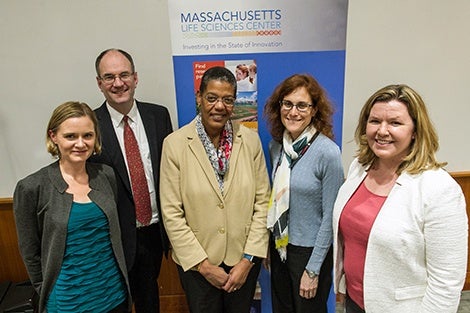May 24, 2017— Scientists are just beginning to understand the many ways in which our microbiomes—the trillions of microbial organisms that live on and inside our bodies—influence a range of threats to human health including cancers, diabetes, heart disease, and obesity. To help leverage the power of this new area of research, Harvard T.H. Chan School of Public Health is creating an integrated platform to collect, use, and analyze microbiome-based specimens.
Harvard Chan School received $4.9 million from the Massachusetts Life Sciences Center to launch Biobank for Microbiome Research in Massachusetts (BIOM-Mass) in collaboration with the Brigham and Women’s Hospital (BWH) and Massachusetts General Hospital (MGH). The award is part of $18 million in capital infrastructure grants given by the Massachusetts Life Sciences Center to research institutions in Boston. These awards were highlighted at a ceremony at Harvard Medical School on May 15, 2017.

“Our capacity to uncover how the human microbiome interacts with our organ systems stands to revolutionize how we approach human health, disease prevention and detection, and potential treatments,” said Michelle Williams, Dean of Harvard Chan School.
There are about 10 times as many microbial cells on and in the body as human cells. Found in communities unique to every individual on the skin, and in the mucous membranes, gut, and other areas, they help regulate human health through functions such as training the immune system and maintaining healthy digestion. Researchers believe that the makeup of the flora in a person’s microbiome impacts their health, and that it may be possible to adjust the microbiome to prevent and treat conditions including inflammatory bowel disease and asthma.
BIOM-Mass, led by Eric Rimm, professor of epidemiology and nutrition and Wendy Garrett, professor of immunology and infectious diseases, will create the world’s most comprehensive human microbiome specimen collection, using samples from more than 25,000 individuals from the School-based Nurses’ Health Study II and other long-running cohort studies. The researchers will catalog the microbial populations across multiple body sites from study participants, combining that data with individual lifestyle, health, and genetic information that has already been collected. The facility will also include a data portal, which will enable scientists to access an unprecedented volume of information on the microbiome.
“This is a fantastic opportunity to bring together a broad interdisciplinary team from academia and industry to mine the complex interactions between exposures such as diet, environmental exposures, and therapeutics in relation to the microbiome and to look at how microbes impact metabolism, disease etiology, early disease detection, and ultimately treatment,” said Rimm.
The three BIOM-Mass home institutions (Harvard Chan School, BWH, MGH) aim to maximize the facility’s utility to the scientific community.
“The Biobank for Microbiome Research will advance not only public health, but also Massachusetts’ life science ecosystem,” Williams said. “There are very few ‘moments’ when scientific, technological, and methodological advancements converge with as much potential impact as they have in the emergent field of microbiome R&D.”
Photos: Bethany Versoy
